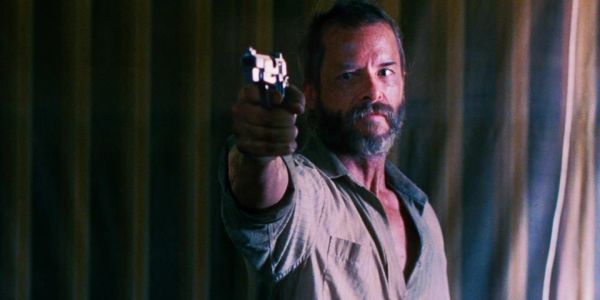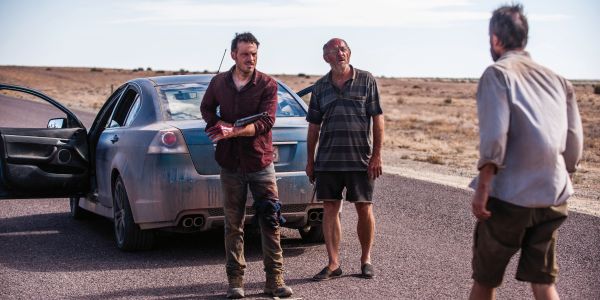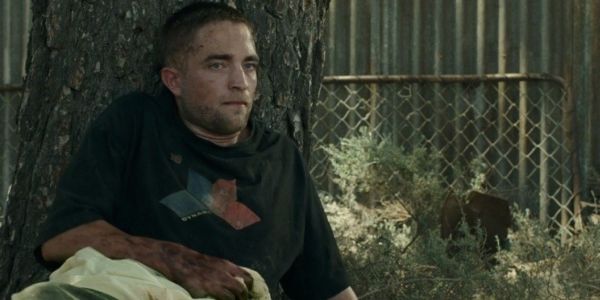THE ROVER Is An Empty Shell Despite Great Performances

Manon de Reeper is the founder and CEO of Film…
Here at Film Inquiry, we were quite excited about The Rover. The trailer looked very promising; moreover, the movie was directed by famous and notorious director David Michôd. Famous for his hauntingly emotional scripts, notorious for the amounts of violence he tends to feature.
The Rover opens with a long, single shot of Eric (Guy Pearce), sitting in his car. He remains still – seemingly catatonic. Finally, he gets out of the car, and we’re introduced to the Australian desert. He enters a small, opium den-like establishment, sits down, and continues to stare catatonically, occasionally sipping his drink. Meanwhile, we meet a car full of American thugs, who are rushing away from a gun-fight, where one of them got shot in his leg – the brother of the thug with the legwound. In their fear and agitation, the men get into a fight inside the car, and the driver loses his control over the wheel, resulting in a crash.
Back to Eric, who still sits, sipping and staring catatonically. Behind him, through the window, we see the Americans’ car crash, roll and tumble. The men are alive and well, see Eric’s car, steal it and rush off. Now, Eric gets out of his stupor, hurries outside, takes the crashed car, and commences pursuit – tailing them aggressively. They eventually stop their cars to discuss what’s going on. Eric tells them they have to get out of the car and leave it. The men aren’t too impressed and hit Eric in the face, with the butt of a gun. When Eric wakes up to find himself in the desert, left with the old, crashed truck, he’s thoroughly pissed off.

This is the opening of The Rover. In this post-apocalyptic world, of which we know nothing other than that people, in general, really want to kill each other, Eric is set to retrieve his last personal possession: his car. He sets off on his mission and along the way meets many. Among them is Rey (Robert Pattinson), the brother of the thugs that was left in the wake of the gun-fight. They team up and travel through the desolate, post-apocalyptic world together.
Innocence and Violence Meet in a Bleak World
Eric turns out to be a man with a penchant for violence, not surprising if you consider Michôd‘s preference for it. He shoots many, innocent or less innocent, without a second thought – he’s merciless and conscienceless. Rey, on the other hand, is naïve, even sweet, and he doesn’t remember the world from before the apocalypse. He’s used to taking orders from his big brother, and soon follows Eric around almost blindly.
First of all, credit must be paid to Natasha Baier, responsible for the cinematography of The Rover. She painted the world in very bleak colors, and the camera work was magnificent. The wide, expansive shots of the Australian desert were beautiful, the close-ups all came in the right moments, paying special attention to the emotional reactions of characters. Furthermore, the music is very befitting of the general atmosphere of the movie: dark, sometimes even hauntingly so. One misstep was the jarring choice for a very cheerful tune while the two men were on the road, one shot, the other almost too tired to drive, still in pursuit of the car; perhaps they wanted to lighten the mood a little, but it felt off.
Constant Lack of Explanation
A major issue with this movie is the lack of explanation. While it hints at more, there isn’t any. Eric is a very superficial character, even though Guy Pearce continuously hints at greater depths. His attempts are worthwhile and his performance is truly impressive (e.g. he gave the character a very subtle limp, hinting at past battle scars), but the script lacked, failing to define the character.

Rey is a better developed character, and Robert Pattinson played him surprisingly well. I didn’t appreciate him much before, as an actor, but he’s definitely caught my attention with this performance. Rey’s a fairly dimwitted character, suffering from a whole bunch of tics, which are more prevalent when he’s nervous. Pattinson gave it his all, being more emotive than I’ve ever seen him before. Rey’s definitely the more interesting character, even though we get to know relatively little about his back story, too.
Furthermore, we know nothing about what happened to the world. Nothing is told about the economic collapse that apparently caused this apocalypse-like event. While the information isn’t necessarily very relevant to the story that’s actually told, it made what little was hinted at regarding the event confusing.
The story for The Rover was written by director David Michôd, in collaboration with Joel Edgerton, an Aussie actor famous for his roles in Warrior (2011) and The Great Gatsby (2012). I think the two took the old writers’ saying of “show, don’t tell” a little too close to heart and overdid it. Apparently, they realized this too, as the new The Rover website offers a whole bunch of extra information they forgot to share in the movie: a special statement from the director, a map of what the world looks like in The Rover and a timeline of the collapse. It’s a nice touch, but it doesn’t make up for the lack of information in the movie.

Furthermore, strangely enough, even ten years after the collapse, canned food is still readily available, as well as petrol, which struck me as unlikely. There were no farms, no cattle. There weren’t any cannibals. Apparently, people were just very good at rationing, and that despite the high levels of senseless violence. Which didn’t even revolve around food or other bare necessities.
To Conclude
I saw the movie alone, and as I was explaining the story to my partner afterwards, he burst out in laughter: to him, the plot sounded absolutely ludicrous. And it is, if you take away the beautiful imagery of the Australian desert and the great performances of Pattinson and Pearce. Nothing happens, except they go around killing random people to get that car back, and the ending tries to give the movie a sense of meaning but truly, it’s very farfetched. I can already imagine that living in the Australian desert after economic collapse isn’t easy and that it opens up opportunities for all sorts of mentally unstable people to go about their violent ways and that motives would become jumbled, and the movie made that point poorly. Furthermore, I’m not at all against violence in film, but I do require an explanation of why characters have become so jaded and violent. Otherwise, to me, it just feels like they’re portraying violence for the sake of violence, and I hate to use that phrase.
Despite Pearce and Pattinson’s surprisingly outstanding performances (especially in the case of the latter), the great cinematography and good music, it can’t make up for the fact the script lacked sorely. All in all, The Rover feels like an empty shell, pretending to be more than it is.
What do you think of movies set in a post-apocalyptic world: should characters still reason rationally, or is it logical for them to lose their sense of reason? Or is it just an excuse for meaningless, motiveless violence?
Anyway, if you liked this article, please share it with the digital world of the social networks by clicking the sharing buttons on the left – in return, I promise I won’t shoot you if we’d end up in an apocalypse. Honestly!
Does content like this matter to you?
Become a Member and support film journalism. Unlock access to all of Film Inquiry`s great articles. Join a community of like-minded readers who are passionate about cinema - get access to our private members Network, give back to independent filmmakers, and more.
Manon de Reeper is the founder and CEO of Film Inquiry, and a screenwriter/producer. Her directorial debut, a horror short film, is forthcoming in 2021.













